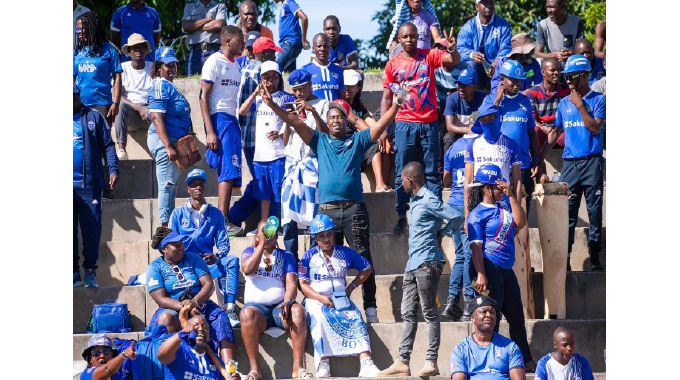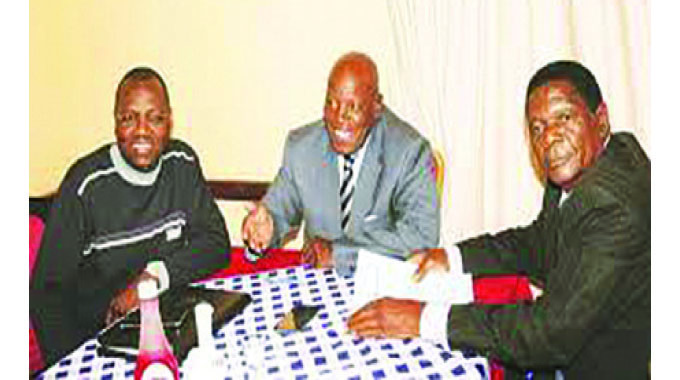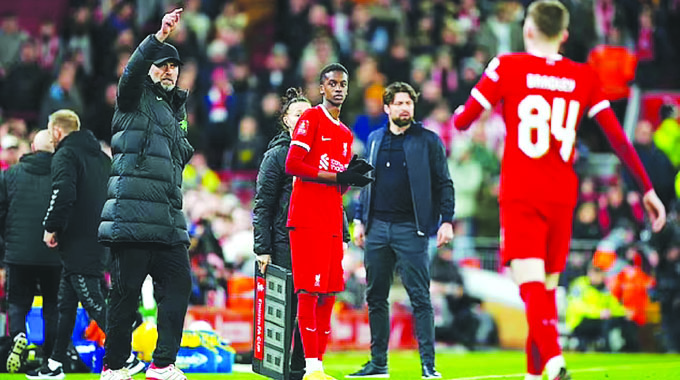DON’T BLAME ANYONE, BUT THE GREEK TRAGEDY THAT ALWAYS STALKS OUR DEAR WARRIORS
ON a chilly morning on April 28, 1993, I accompanied my then senior workmate, the late Sam Marisa, to the National Sports Stadium for what we expected to be a routine coverage of a training session of the Dream Team. Reinhard Fabisch and his Warriors were riding on the crest of a wave, the darlings of a nation whose flag they were flying with distinction on the tough battlefields of African football, and were unbeaten in 10 World Cup/Nations Cup qualifiers stretching over two years.
Four days earlier, they had been in South Africa, and picked a priceless point against Bafana Bafana, in a ’94 Nations Cup qualifier, with Benjamin Nkonjera, whose diminutive frame bellied the indomitable spirit buried in his soul of a tiger and heart of a lion, scoring our goal in that 1-1 draw.
In a period congested with tough fixtures for the Dream Team, in their double-barrelled quest to qualify for the Nations Cup and World Cup finals, Fabisch and his men had become allergic to defeat, never retreating, never surrendering, and not even the Pharaohs of Egypt could beat them on the neutral fields of the French city of Lyon in a ’94 World Cup qualifier.
From getting everything underway with a 4-1 pounding of Bafana Bafana, beating Togo home and away, slaying the Pharaohs in Harare and forcing a replay in Lyon, beating Angola and holding Zambia in Lusaka, the Dream Team had answered all questions thrown at them with distinction.
And, now, they stood on the threshold of qualifying not only for the Nations Cup finals, something that successive generations of our finest footballers had tried, and failed to do, in the ‘80s, but also winning one of three slots reserved for African teams at the ’94 World Cup showcase.
The Dream Team were in the final phase of the elimination duels for that World Cup, one of just nine teams on the continent who had managed that feat, and that morning, on April 28 ’93, they were preparing for the first of those heavyweight battles against Guinea, in Conakry, in just four days’ time.
The first signs, that everything wasn’t well, emerged just after our arrival at that training session when we noticed that Fabisch wasn’t conducting the session and, instead, the usually animated German cut a lonely figure, as he watched the proceedings from the athletic track, while his lieutenants conducted the orchestra.
We approached him, for a chat, hoping to fix an appointment for an interview after the session only for him to surprise us that we didn’t need to worry for the end of that training session as he was ready to talk there and then.
And, when he erupted, it was something that shook the two of us and, although we didn’t know it then, would be a turning point in this adventure.
He was QUITTING, he thundered, his voice — powered by the waves of emotions exploding in his body — rising with each passing phrase and sentence, swear words popping now and again in that rumble, his face picking a darker shade from the rage and his anger clearly evident.
“I HAVE A FEELING THAT WE ARE BEING LEFT ALONE,” Fabisch fumed. “EVERYONE IS ENJOYING THE SUCCESS OF THE TEAM BUT NO ONE IS DOING ANYTHING TO HELP US.
“IT WOULD BE VERY HARD FOR ME TO TELL THESE PLAYERS THAT THEY WILL BE PLAYING FOR NOTHING AFTER A SACRIFICE FOR THEIR NATION. I THINK I HAVE CONTRIBUTED A LOT AND I HAVE DONE MY BEST BUT ONE DAY MY PATIENCE HAD TO BE EXHAUSTED.
“I AM TIRED, MENTALLY AND PHYSICALLY AND, AFTER GUIDING THE TEAM TO 10 MATCHES WITHOUT DEFEAT, WE HAVE DISCOVERED THAT BEING CHEERED AND PRAISED IS NOT ENOUGH.
“AT A TIME WHEN EVERYTHING IS GOING WELL FOR THE NATIONAL TEAM THEY (ZIFA) ARE STARTING AGAIN TO FRUSTRATE ME. I THINK THE NATIONAL TEAM HAS PRODUCED THE RESULTS THAT ANY FOOTBALL ASSOCIATION WOULD BE PROUD OF.”
The next day, when the Warriors were boarding their plane for the trip to Guinea for that World Cup showdown, we ran the story under the screaming headline ‘FABISCH DROPS BOMBSHELL’ and the reaction, from the fans, was swift and brutal, as they all turned their guns on ZIFA.
They called for the association’s leadership, commanded by Trevor Carelse-Juul, to be disbanded and virtually everyone, including people who normally would not care about what the Warriors were doing, joining the bandwagon in outpouring wave of support for Fabisch.
Of course, the ZIFA leaders fought back and revealed that Fabisch’s fallout with them had been triggered by the coach’s proposal that the Dream Team share 40 percent of net proceedings from gate-takings and other revenue streams related to the remaining four international home matches against Cameroon, Zambia, Guinea and Mauritius.
They also provided documents which showed that the coach wanted 75 percent of the estimated US$5 million which the Warriors would be guaranteed, in the event they qualified for the ’94 World Cup finals, an elaborate training camp and other luxuries.
In that ocean of chaos, the Dream Team flew out to Guinea but something had changed and, nothing would ever be the same, and — a few days later — they crashed to a 0-3 defeat at the hands of the West Africans, inspired by Titi Camara, as our proud unbeaten run under Fabisch came to a crushing and painful end.
We didn’t know it then, as the result filtered through from Conakry, that this was the beginning of the end of the Dream Team and everything that it had given us, memories to last a life-time, a romance like no other, and the World Cup dream, just like the Nations Cup dream, turned into a nightmare.
THE GREEK TRAGEDY THAT IS PART
OF OUR FOOTBALL DNA
Exactly 23 years later, as cruel fate might have it, in this month of April, we find ourselves trapped in a quagmire of the chaos triggered by revelations on Sunday that Warriors’ coach Callisto Pasuwa hasn’t been paid his salary in the past two months.
And, as I watched the drama unfold this week, my mind raced back to those events in April ’93 and where Pasuwa resembled Fabisch who, like the German gaffer before him, was also “FEELING THAT I AM BEING LEFT ALONE, EVERYONE IS ENJOYING THE SUCCESS OF THE TEAM BUT NO ONE IS DOING ANYTHING TO HELP ME, I HAVE CONTRIBUTED A LOT AND I HAVE DONE MY BEST BUT ONE DAY MY PATIENCE HAD TO BE EXHAUSTED.”
Pasuwa, unlike Fabisch, has said he wasn’t the source of the story that triggered the mayhem but, like Fabisch before him, our good coach – who has defied the odds to take us three points clear in our quest for a return to the Nations Cup finals – finds himself confronted by the same challenges that the German dealt with.
When a journalist stumbled upon his story, just like that day when Fabisch talked to me and my colleague Sam Marisa, he felt it was his job to tell it to the nation — just as we did all those years back — and the rest, the drama that would follow, would take care of itself.
Fabisch’s Dream Team never recovered from that spectacular and ugly fallout, the thrashing in Guinea — who as if the football gods have an axe to grind against us, proving to us that lightning can, indeed, strike twice and are once again providing a hurdle that could crush our bid for a return to the Nations Cup finals in more than a decade — pegging us back.
While many have chosen to look at this as yet another ugly fallout between the media and some people in our football boardrooms, in the arguments and ugly fights that have followed the revelations that Pasuwa hasn’t been paid his salary for the last two months, history has made me realise that this Greek Tragedy is just part of the Warriors’ DNA and, somehow, fate will always strike and provide bigger obstacles than those our opponents provide on the pitch.
They say a Greek Tragedy is a “drama of literary work in which the main character is brought to ruin or suffers extreme sorrow, especially as a consequence of a tragic flaw, moral weakness, or inability to cope with unfavourable circumstances or a play, film or television programme, or other narrative work that portrays or depicts calamitous events and an unhappy ending.”
Lovemore Banda, back in the days when he was the presenter of sports news on ZTV’s main news edition, when he used to greet us with that booming voice saying, “I hope I find you well,” even when he knew we were not well, our spirits having been crushed by another Warriors’ poor show, talked about this being a Greek Tragedy where, even though the characters will change now and again, the script will always be the same and there would be tears at the end.
If not, how do we explain that Joel Luphahla’s perfect strike in the Egyptian city of Ismailia, which should have taken us into the quarter-finals of the 2006 Nations Cup finals, after giving us a 3-1 win over a World Cup-bound Ghana, is somehow disallowed for reasons that, even up to now, no one can explain, and we suffer and that makes the difference between us remaining in the tournament and returning home.
I covered that game and, maybe, I am a bit biased because these are the Warriors, this is my team, these are my heroes, it’s our flag they are flying, it’s our identity they are parading, it’s our dreams they are fulfilling, it’s our hopes they are representing and, in such a scenario, my fairness could be challenged, and for food reason too.
So, let’s consider the report of someone else, Pirate Irwin, who has no bias towards the Warriors, who was covering the same game for IOL:
“A late disallowed goal saw Zimbabwe narrowly miss out on the African Cup of Nations quarter-finals on Tuesday although they beat Ghana 2-1,” he writes.
“Goals by Cephas Chimedza and Benjani gave the Warriors a well-deserved victory over the lifeless Black Stars, whose hopes at the World Cup finals look very dim – a late goal by Baba Adamu was not enough to salvage their pride.
That’s a neutral journalist writing that, not me, not Makomborero Mutimukulu, not Petros Kausiyo, guys whose views could be dismissed as having been blinkered, in the heat of that moment, by our identity as Zimbabweans.
What did then Warriors’ coach, Charles Mhlauri, think about all this?
“We are very disappointed. We could have qualified but we were unlucky. We tried to score the third goal. The referee disallowed one and, if we had been on the scoreboard, I don’t think they would have scored and we would have gone through.”
Let’s turn to the BBC Sport and see how they viewed that crucial incident.
“With the game in injury time, Zimbabwe had cause to hope for a miraculous quarter-final berth but (Luphahla’s) goal was flagged offside by the linesman.”
WHY ALWAYS US, YOU MIGHT
ASK YOURSELVES
Okay, maybe we can give that blundering assistant referee in Ismailia the benefit of doubt, that he saw something that nobody else saw, and his diabolical ghost call, which sent us packing and returning home and not playing in the quarter-finals of the 2006 Nations Cup, was the right one.
But what about our ’96 Nations Cup campaign, which got off to a flying start when we thrashed Lesotho 5-0 here, with Vitalis Takawira scoring twice and Kenny Nagoli, Francis Shonhayi and Adam Ndlovu also on target that afternoon?
Well, we went on to beat the DRC 2-1, with Peter and Adam on target, thrashed Cameroon 4-1, with Vitalis scoring a hattrick and beat Lesotho 2-0 in their backyard with Agent Sawu and Isaac Riyano on target for us.
The same Lesotho which, in that campaign, produced one of the biggest shocks in the history of African football when they beat Cameroon 2-0 in Maseru, a result that should have done wonders for our campaign.
But, you guessed it right, these are the Warriors and they will always be stalked by Greek Tragedy and, boom, just when we seemed on course to qualify for South Africa, Lesotho withdraw from the qualifiers and our two victories over them, including seven goals, are nullified, just like that, and Cameroon — who had lost in Maseru — benefit immensely from all this.
Okay, despite this setback, our heroic Warriors battle on but, just before a crucial away game in Kinshasa, there is an outbreak of the Ebola virus in the DRC and virtually all our first-team players decide they cannot take the risk because, in the case of those based in Europe, they might be barred from travelling back to their bases.
So, what do we do, we send a makeshift team, for what should have been a very big game for us, because fate has hammered us hard, the Greek Tragedy has come back to strike again, and that team is hammered 0-5 in Kinshasa, the same number of goals that we had scored against Lesotho when we got our campaign underway, and it’s all over for us.
What about the 1998 Nations Cup qualifiers?
We start, once again, in style as we hammer Sudan 3-0 in their backyard in Khartoum, with Bruce Grobbelaar in charge of our Warriors, and we all begin to believe that, if we can pick such priceless three points on the road, we are in a good position to qualify.
But then, boom, it all explodes in our face as Sudan withdraw from the qualifiers and our victory there, built around a double by Sawu, is nullified and — once again — we suffer because a team that we have beaten has pulled out of the battle.
What about the 1994 Nations Cup qualifiers. We haven’t lost a game in 10 World Cup and Nations Cup qualifiers, when Fabisch drops his bombshell that he is quitting, and everything is thrown into chaos but what we just need is to beat a Zambian team still reeling from the devastation of that plane crash off the coast of Gabon.
We have the home advantage, Zambia are still grieving, the best of their players lie buried in graves outside the old Independence Stadium, and surely, even if this assignment should be too much for Kalusha and his colleagues.
And, as if on cue, we take the lead, we hit the post, we dominate, and everything is going according to plan until the final 100 minutes when, boom, Kalusha — who had never scored a goal with his head in international football before — somehow glances a header past Grobbelaar and Chipolopolo get the point, they barely deserved, and the ticket to the 2004 Nations Cup finals.
Just to show how good we were, we watch as the same Zambian team reach the final of those AFCON finals in Tunisia, only to lose to eventual winners Nigeria 1-2.
Maybe, we should have known it, that ours will never be an easy adventure on these football battlefields when, just after Independence in 1980, we were greeted with a tough battle against Cameroon in the ’82 World Cup qualifiers.
We lost 0-2 in Yaounde and although David Muchineripi scored the winner for us at Rufaro it was too little, too late, to keep us in the competition.
Show me any other national football team that has ever gone 10 matches, in the World Cup/Nations Cup qualifiers, winning six times and drawing four, and didn’t make it to the finals, which isn’t the Dream team, and if that team exists, then I will forget about this Greek Tragedy that continues to stalk our Warriors.
Show me a national football team that has ever been banned from playing in the World Cup qualifiers, who are not the Warriors, because they didn’t pay their national coach and I will stop believing in this Greek Tragedy that continues to stalk our favourite team.
Show me a national football team that has even been threatened with being banned from playing in the World Cup qualifiers, for a tournament that will be played six years from now, who are not the Warriors, because they didn’t pay their national coach and I will stop believing in this Greek Tragedy which I feel continues to haunt my favourite team.
Show me a national football team whose coach was banned by CAF for a year, for suggesting that the referees were biased towards the hosts, just when he was doing wonders with that team, as was the case with Fabisch after our controversial defeat in Cameroon in 1993, and I will stop believing in this Greek Tragedy which I believe continues to stalk my favourite team.
I was there, in April 1993, when the blue-torch paper that consumed the Dream Team was lit and, 23 years later, I can see it all happening again, maybe I’m just seeing ghosts and, if that is the case, I ask for your forgiveness, but I don’t blame anyone, it’s just the way it is.
As the Catholics always, “sezvakanga zviri pakutanga, nazvino, nakare kese, nemisi isingapere, Amen.”
To God Be The Glory!
Come on Warriors!!!!!!!!!!!!!!!!!!!!!!!!!!!!!!!!!!!
Khamaldinhoooooooooooooooooooo!
Text Feedback – 0772545199
WhatsApp Messenger – 0772545199
Email – [email protected]
Skype – sharuko58
Chat with me on Facebook, follow me on Twitter @Chakariboy, interact with me on Viber or read my material in The Southern Times. The authoritative ZBC weekly television football magazine programme, Game Plan, is being refreshed and we off air for now.







Comments